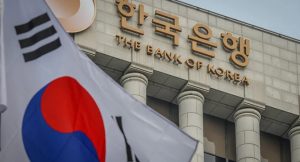Bloomberg
The Bank of Korea (BOK) is set to raise its key interest rate one more time, with policymakers then seen bringing their 18-month tightening cycle to a close amid rising concerns about the economic outlook.
Eleven of 16 economists surveyed expect the central bank will hike the benchmark to 3.5%, while the remaining five expect it to hold at 3.25% in the first meeting of the year. The BOK has lifted borrowing costs from a record-low 0.5% in August 2021, at times moving in half percentage-point increments.
Predictions the central bank will stand pat reflect increasing headwinds for South Korea’s economy ranging from declining exports to weakening industrial production and falling house prices. There’s also some wariness following an autumn credit market rout triggered by default of a local theme-park developer.
Money markets are already pricing in the prospect of a pivot, with swaps showing a quarter-point rate cut in next six months. The yield on three-year government bonds has fallen about 100 basis points since September.
Still, most economists expect one more rate increase. They point to inflation running at more than double the central bank’s target and the US’s ongoing tightening cycle, with the risk of a widening rate differential renewing pressure on the currency. They also cite Governor Rhee Chang-yong’s own comments.
In his New Year’s message, Rhee said the BOK will do its best to coordinate policy with the government to ensure the economy has a soft landing, while adding that the focus of policy remains on fighting inflation for now.
“The 25 basis point hike in January should be the last in the current rate-hike cycle,†Oh Suktae and Seong Kiyong, economists at Societe Generale, said in a research note. “Concerns surrounding financial stability are now concentrated on the burden of corporate leverage and the weakness in the housing market.â€
Money markets are already pricing in the prospect of a pivot, with swaps showing a quarter-point rate cut in the next six months. The yield on three-year government bonds has fallen about 100 basis points since September.
Rhee said last month that three of the BOK’s seven board members wanted tightening to end at 3.5%, while two remained open to a higher rate. One wanted to end the cycle at the current 3.25%. The governor is the other director and declined to disclose his view.
The policy statement is likely to focus on weakness in economic activity and even suggest a cut to the 2023 growth forecast, Societe Generale said.
Trade resilience had been a major source of reassurance for the central bank that the economy could withstand higher rates. That may no longer be the case given exports are falling, with semiconductor demand waning rapidly.
Yet inflation remains around 5%, well in advance of the BOK’s 2% target. The Federal Reserve’s ongoing rate hikes also reinforce the need for Korea to remain at the ready to avoid an excessive widening of rate differentials with the US.
Policy makers don’t want the currency depreciating excessively and further fueling inflation through imports.
 The Gulf Time Newspaper One of the finest business newspapers in the UAE brought to you by our professional writers and editors.
The Gulf Time Newspaper One of the finest business newspapers in the UAE brought to you by our professional writers and editors.
